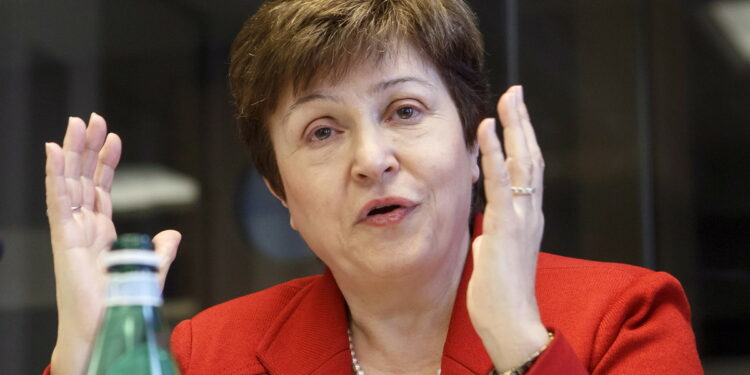IMF boss elated about Ghana’s progress in bringing SLA agreement to Executive Board
Ghana is making significant progress towards finalizing its staff-level agreement with the International Monetary Fund (IMF), a deal which could potentially bring the West African nation $3 billion in support over the next three years. The news has been welcomed by the Managing Director of the IMF, Kristalina Georgieva, who praised Ghana for its efforts to stabilize the economy and promote an inclusive recovery.
“Wonderful to meet President @NAkufoAddo at #MSC2023. Very pleased to hear authorities are making progress on bringing the staff-level agreement to the IMF Exec. Board. We support Ghana’s efforts to stabilize the economy & promote an inclusive recovery,” she tweeted.
The staff-level agreement, if approved, would be supported by an arrangement under the Extended Credit Facility (ECF), which provides financial support to countries that face serious balance of payments problems. This funding will be contingent on Ghana’s ability to receive financing assurances from its partners and creditors, a requirement that the IMF Boss confirmed in a Frequently Asked Questions session.
Ghana has faced significant economic challenges in recent years, including fiscal and debt vulnerabilities that were exacerbated by the COVID-19 pandemic. The country’s public debt increased significantly, while the government’s efforts to preserve debt sustainability were not seen as sufficient by investors, leading to credit rating downgrades and ultimately Ghana’s loss of access to international capital markets.
As a result, the government requested assistance from the IMF in the summer of 2022, and a staff-level agreement was reached in December of the same year. The agreement is part of the government’s economic program, which aims to restore macroeconomic stability and debt sustainability while protecting the vulnerable, preserving financial stability, and laying the foundation for a strong and inclusive recovery.
One of the key challenges facing Ghana is its debt situation, which the government has sought to address through a comprehensive debt operation. The Finance Minister, Ken Ofori-Atta, recently briefed Parliament on the state of affairs regarding the Domestic Debt Exchange Programme (DDEP), urging lawmakers to support the government in securing board approval from the IMF to ensure economic stability. Ofori-Atta noted that an IMF deal would help Ghana recover quickly from its economic challenges and create the conditions for inclusive and sustainable growth and job creation.
If approved, the IMF deal would help alleviate exchange rate pressures and provide a catalytic effect on additional sources of financing. The program would also support Ghana in implementing policies that restore macroeconomic stability and ensure debt sustainability while protecting the most vulnerable parts of its population. This is critical for Ghana’s economic growth and development, given the country’s potential to become a leading economy in West Africa.
Ghana’s progress towards finalizing its staff-level agreement with the IMF is a significant step towards stabilizing the country’s economy and ensuring long-term growth and development. The government’s commitment to preserving debt sustainability and protecting the vulnerable, combined with the IMF’s support, is a promising sign for Ghana’s future. However, there are still challenges ahead, and it is essential for the government to continue implementing policies that promote inclusive growth and job creation, while ensuring that the most vulnerable are protected.









